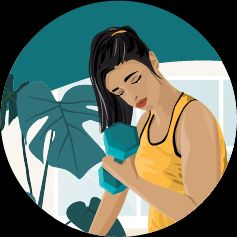Chronic inflammation, medication side effects, and the potential mental strain of having the condition can contribute to experiencing fatigue with ulcerative colitis.
Fatigue is considered an overwhelming sense of tiredness that is not relieved by rest or sleep. It affects 80% of people with active inflammatory bowel disease (IBD) and 50% of people in medical remission.
Approximately
Fatigue and low energy are common occurrences for people with UC. A
- anemia
- dehydration
- depression
- sleep disturbances
- nutritional deficiencies
These challenges are often associated with increased fatigue and daytime sleepiness, among others.
Other potential
- chronic inflammation
- arthritis (a common co-occurring condition with UC)
- changes in the brain-gut axis
- UC medication side effects
Your body may need to expend more energy in trying to fight these challenges, which could make you feel more tired than usual.
If you have UC and have suddenly or progressively developed fatigue, it may be a good idea to talk with a healthcare professional. They can help determine if you have a co-occurring condition or if your UC treatment may need adjustment.
It can be challenging to quantify feelings of fatigue, but the frequency and severity of fatigue
- stress levels and available support
- severity of other symptoms and flare-up frequency
- co-occurring causes like anemia or vitamin deficiencies
- current treatment
All experiences are valid. If you find that your energy levels reduce your quality of life and interfere with your daily activities, a healthcare professional can help you explore management options.
Adrenal fatigue is the theory that high levels of stress may trigger adrenal insufficiency, a medical condition in which the adrenal glands do not produce enough hormones to manage inflammation markers. Fatigue is a common symptom of adrenal insufficiency.
Although the concept of adrenal fatigue is not widely accepted within the medical community, and science doesn’t back these claims, the theory proposes that chronic stress inhibits the adrenal glands’ ability to produce necessary hormones like cortisol. Low levels of these hormones can trigger symptoms like fatigue.
According to this theory, the mental and physical stress associated with living with UC could mean you could develop adrenal fatigue. There’s no scientific proof that this is the case, though.
If fatigue is interfering with your life and the things you care about, it may be a good time to speak with a healthcare professional about this specific symptom.
A
While there is currently no cure for UC, treatment can manage symptoms and lead to remission.
You may need to work with a rheumatologist and a gastroenterologist to explore a treatment plan that will reduce active flare-ups. They may suggest adjusting or changing your medication, and could offer guidance related to diet modifications, recommended exercise plans, and surgical options.
Joining a support group or speaking with a mental health therapist may also help you cope with the stress and emotional weight of living with the condition.
If you’re looking to connect with other people with your condition, resources like Healthline’s Bezzy IBD offer an online safe space for community, peer and expert guidance, and support.
Other ways to reduce fatigue
In addition to treating underlying UC symptoms and any related health conditions, you may want to consider:
- starting an exercise routine
- taking the necessary nutritional supplements, if you have deficiencies
- avoiding or stopping tobacco use, if you do
- not taking long naps (especially later in the day)
- engaging in relaxation techniques like deep breathing, grounding, and meditation
- tracking fatigue symptoms to identify possible patterns and triggers
If you have UC, you’ll likely experience some degree of fatigue. This may result from aspects of living with the disease, like chronic inflammation, medication side effects, or the mental strain of having a painful chronic condition. It may also be linked to co-occurring conditions like anemia.
A healthcare professional can help you identify the cause of fatigue and adjust or modify your UC treatment to minimize symptoms and medication side effects. Support groups and mental health professionals may also offer tips and coping strategies for fatigue and other symptoms.





